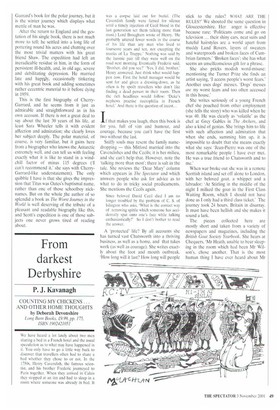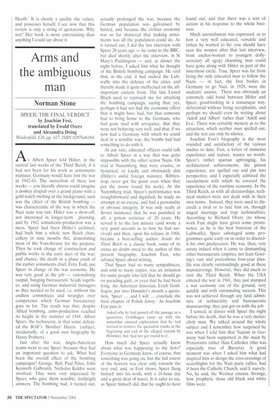From darkest Derbyshire
P. J. Kavanagh
COUNTING MY CHICKENS . . . AND OTHER HOME THOUGHTS by Deborah Devonshire Long Barn Books, £9.99, pp. 175, ISBN 1902421051
We have heard a lot lately about two men sharing a bed in a French hotel and the usual speculation as to what may have happened in it. You only have to go a little way back to discover that travellers often had to share a bed whether they chose to or not. In the 1750s, Henry Cavendish, the famous scientist, and his brother Frederic journeyed to Paris together. When they arrived in Calais they stopped at an inn and had to sleep in a room where someone was already in bed. It
If that makes you laugh, then this book is for you, full of vim and humour, and courage, because you can't have the first two without the last.
Sniffy souls may resent the family namedropping — this Mitford married into the Cavendishes and the Cecits; it is her milieu, and she can't help that. However, note the 'talking more than most': there is salt in the tale. She reviews the 'Dear Mary' column which appears in The Spectator and which answers people who ask for advice as to what to do in tricky social predicaments. She mentions the Cecils again.
Since beloved David Cecil died I am no longer troubled by the problem of C. S. of Islineton who asks, 'What is the correct way of removing spittle which someone has accidentally spat onto one's face while talking enthusiastically?' So I don't bother to read the answer.
A 'protected' life? By all accounts she has turned vast Chatsworth into a thriving business, as well as a home, and that takes work (as well as courage). She writes exactly about the foot and mouth outbreak. 'How long will it last? How long will people
stick to the rules? WHAT ARE THE RULES?' We shouted the same question in Gloucestershire. Her anger is effective because rare: -Politicans come and go on television ... their shiny cars, neat suits and hateful hairstyles are a world apart from muddy Land Rovers, layers of sweaters and waterproofs and broken faces of Cumbrian farmers.' Broken faces': she has what seems an unselfconscious gift for a phrase.
She also pricks modish word-misuse: mentioning the Turner Prize she finds an artist saying, 'I access people's worst fears.' Another uses dogs' messes. 'Dogs' messes are my worst fears and too often accessed in this house.'
She writes seriously of a young French chef she poached from other employment (she tells the story) who was killed when he was 40. He was clearly as 'volatile' as the chef at Grey Gables in The Archers, and also a kind of genius. She brings him to life with such affection and admiration that when she ends, summing him up, it is impossible to doubt that she means exactly what she says: Jean-Pierre was one of the most remarkable people I have ever met. He was a true friend to Chatsworth and to me.'
When war broke out she was in a remote Scottish island and set off alone to London, with her beloved goat. a whippet and a labrador: 'At Stirling in the middle of the night I milked the goat in the First Class Waiting Room, which I should not have done as I only had a third class ticket.. The journey took 24 hours, Britain in disarray. It must have been hellish and she makes it sound a lark.
The pieces collected here are mostly short and taken from a variety of newspapers and magazines, including the British Goat Society Yearbook. She hears at Chequers, 'Mr Heath, unable to bear sleeping in the room which had been Mr Wilson's, chose another. That is the most human thing I have ever heard about Mr
Heath.' It is clearly a quality she values, and possesses herself. I see now that this review is only a string of quotations. Why not? Her book is more entertaining than anything I could say about it.



















































































 Previous page
Previous page